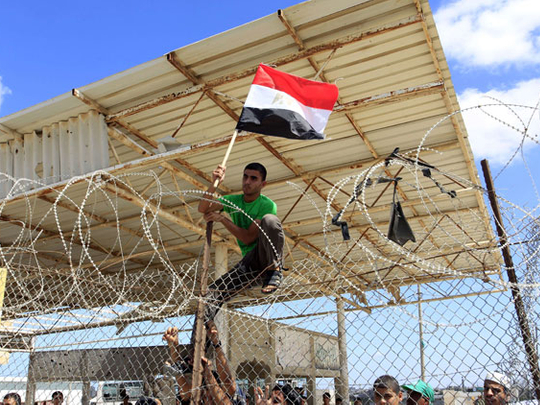
Cairo: A relentless security crackdown on Egypt’s Muslim Brotherhood is distracting attention from the retrial of former president Hosni Mubarak, legal experts say.
“Egyptians have lost interest in whether Mubarak will be convicted or not because a lot of things have occurred since the trial started in August 2011,” Abdul Khaleq Hussain, a lawyer, told Gulf News.
“Mubarak is now an old man whose stature as a ruler has been burnished by the failings made by his successor and the Brotherhood. The public’s attention has now shifted to the Brotherhood leaders’ trials, including that of [Mohammad] Mursi. But, this does not mean Mubarak’s trial is politically handled.”
In June last year, a court sentenced Mubarak to life in prison after finding him guilty of failing to prevent the killing of more than 800 protesters in an uprising that forced him out of power in February 2011. However, the country’s top appeals court in January accepted Mubarak’s appeal and ordered his retrial, which began in May.
Mubarak, now 85, and his two sons are also being retried on charges of wasting public funds.
Last month, a court ordered Mubarak be released after he settled a corruption case, a move that drew protests from revolutionary groups and ignited speculation that he will eventually be acquitted of alleged complicity in protester deaths.
The caretaker government, installed by the army who deposed Mursi in July, hastily put Mubarak under house arrest at a military hospital in Cairo where he is staying. The court, hearing charges against Mubarak, on Saturday barred the media from covering the next three sessions due to start on October 19, citing national security concerns.
“Compared to the first trial that continued for almost a year, I think the current retrial is more organised and has stronger evidence,” Khaled Shukri, a legal expert, said.
“The court’s decision to prevent the media from reporting about testimonies in the coming three session is a lawful procedure, which is to the benefit of the case,” Shukri told Gulf News.
The court has said that at its closed-door hearings on October 19, 20 and 21, several former senior officials will be cross-examined. They include Atef Ebeid who served as prime minister under Mubarak; Murad Mewafi whom Mursi appointed as chief of the intelligence service; Ahmad Jamal Eddin, Mursi’s interior minister; and Hassan Al Rewani, an ex-military commander. There was no immediate explanation for summoning officials who served under Mursi.
“It is probable that the judge thought that testimonies from those persons will help clarify certain points in the case. Or he decided to summon them at a request from the defence lawyer,” Shukri said.
Mubarak’s supporters have frequently accused Mursi, Egypt’s first democratically elected president, of involvement in killing protesters during his turbulent one year in power. Mursi is being detained by the army at an undisclosed location, pending his trial on charges of inciting the murder of opposition protesters and conspiring with the Palestinian Islamist movement Hamas during the anti-Mubarak revolt. Ironically, Mursi will most likely stand trial in a makeshift courtroom on the outskirts of Cairo where Mubarak is being tried.
The independent newspaper Al Shorouk has recently quoted sources close to Mubarak as saying that he will not accept a pardon from the country’s military-backed rulers and that he is confident of proving his innocence in court. Pro-Mursi Islamists say that Mubarak will eventually walk free due to alleged pressure from the military.
“Such claims are baseless,” Shukri said. “If anyone is to blame for the length of Mubarak’s trial, it is the Mursi administration that failed to build strong cases against those who killed protesters. The Brotherhood is trying hard to manipulate the Mubarak case to raise its dwindling street popularity. Whatever the final verdict, it will be based on the proof available to the court, which will have the final say, not anyone else.”












